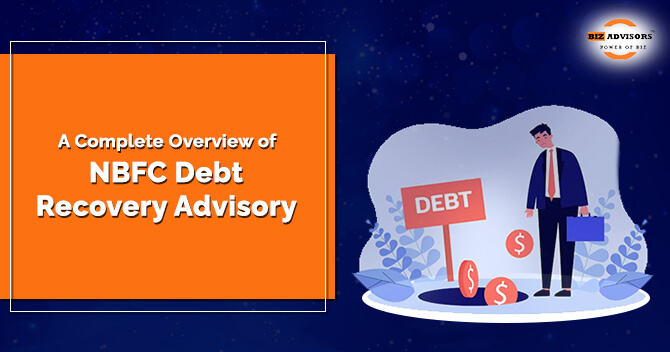Non-Banking Financial Companies (NBFCs) play a pivotal role in providing diverse financial services to individuals and businesses, ranging from loans and credit facilities to investment opportunities. However, in the realm of lending, there exists the possibility of borrowers encountering difficulties in meeting their financial obligations. This is where NBFC Debt Recovery Advisory steps in, serving as a crucial bridge between the financial institution and the borrower, facilitating effective debt resolution strategies.
At its core, NBFC Debt Recovery Advisory involves a specialized team of professionals who are adept at handling complex debt recovery situations. These professionals possess a comprehensive understanding of the financial industry, legal regulations, and negotiation techniques. Their primary objective is to collaborate with borrowers who are facing difficulties in repaying their loans, striving to find mutually beneficial solutions that ensure the recovery of outstanding debts while minimizing the financial burden on the borrower.
In the ever-evolving landscape of financial services, Non-Banking Financial Companies (NBFCs) play a pivotal role in offering diverse credit options to both individuals and businesses. However, with the extension of credit comes the inevitable challenge of debt recovery. Efficient debt recovery is crucial not only for the financial health of NBFCs but also for maintaining a stable credit ecosystem.
This blog aims to provide a comprehensive advisory guide to NBFC debt recovery, exploring the strategies, challenges, and regulatory aspects that define this critical process.
Understanding NBFCs and Debt Recovery
Non-Banking Financial Companies are financial institutions that provide a wide range of banking and financial services without holding a banking license. They include entities engaged in activities like loans, advances, acquisition of shares/stocks/bonds/debentures, leasing, insurance, hire-purchase, and more. One of the primary challenges NBFCs face is ensuring effective debt recovery while maintaining a balanced risk-reward framework.
Debt recovery refers to the process of collecting outstanding payments from borrowers who have defaulted on their loan obligations. It involves various stages, from early intervention and negotiation to legal action, if necessary. Efficient debt recovery not only safeguards the financial stability of the NBFC but also fosters a positive lending environment, encouraging responsible borrowing and lending practices.
Key Strategies for NBFC Debt Recovery
Following are the certain key strategies for NBFC Debt Recovery:-
- Early Warning System and Communication: The first step in debt recovery is early identification of potential defaults. Establishing an early warning system helps detect signs of distress in borrowers’ financials. Timely communication with borrowers who show signs of financial strain can lead to negotiated settlements or alternative repayment plans.
- Restructuring and Resolution: NBFCs can consider loan restructuring when borrowers face temporary financial difficulties. Loan restructuring involves modifying the terms of the loan, such as extending the repayment period, reducing interest rates, or even granting a moratorium on payments. This approach aims to provide borrowers with a realistic chance of repaying their debts.
- Negotiation and Settlement: In cases where borrowers are unable to meet their obligations, negotiations for settlements can be explored. This involves reaching an agreement where the borrower repays a portion of the outstanding debt in exchange for the remaining amount being written off. Careful assessment of the borrower’s financial capacity and potential legal implications is essential in this strategy.
- Legal Recourse: When negotiations fail, NBFCs can resort to legal action. This involves initiating legal proceedings to recover the outstanding debt through mechanisms such as attachment of assets, foreclosure, or repossession. However, legal proceedings can be time-consuming and costly, and NBFCs need to weigh the potential recovery against the associated expenses.
Challenges in NBFC Debt Recovery
Below mentioned are some of challenges in NBFC Debt Recovery:-
- Diverse Borrower Profiles: NBFCs cater to a diverse clientele, ranging from individuals to small and medium-sized enterprises (SMEs). Each borrower’s financial situation is unique, making debt recovery strategies complex and requiring tailored approaches.
- Regulatory Landscape: Debt recovery is subject to various legal and regulatory frameworks. Compliance with laws such as the Insolvency and Bankruptcy Code (IBC) and the Securitization and Reconstruction of Financial Assets and Enforcement of Security Interest (SARFAESI) Act is crucial. Failure to adhere to these regulations can result in legal consequences.
- Data Quality and Analysis: Effective debt recovery relies on accurate borrower data and robust risk assessment. NBFCs need sophisticated data analytics tools to assess credit risk and predict potential defaulters.
- Reputation Management: Balancing debt recovery efforts with maintaining a positive reputation is essential for NBFCs. Aggressive recovery tactics can harm an NBFC’s image and lead to customer attrition.
Regulatory Aspects of NBFC Debt Recovery
The debt recovery process for NBFCs is influenced by various regulations and legal mechanisms. Key regulations that impact NBFC debt recovery include:
- SARFAESI Act: The Securitization and Reconstruction of Financial Assets and Enforcement of Security Interest Act[1] empower NBFCs to take possession of collateral assets upon default and sell them to recover dues. The Act provides a framework for the enforcement of security interests in immovable and movable assets.
- IBC: The Insolvency and Bankruptcy Code provides a resolution framework for distressed borrowers. Under the IBC, corporate debtors can undergo insolvency resolution, leading to debt recovery through a structured process.
- Fair Practices Code: The Reserve Bank of India (RBI) mandates that NBFCs follow the Fair Practices Code, which outlines ethical practices in debt recovery. This includes proper communication with borrowers, respecting their privacy, and avoiding harassment.
- Data Protection Laws: NBFCs need to comply with data protection regulations to ensure that borrower information is handled securely and sensitively during the debt recovery process.
Conclusion
Navigating NBFC debt recovery is a complex yet critical endeavor. As non-banking financial institutions continue to expand their lending portfolios, efficient debt recovery strategies become paramount for their financial stability and growth. Through early intervention, negotiation, and compliance with regulatory frameworks, NBFCs can strike a balance between recovering outstanding debts and maintaining a positive reputation.
A holistic approach that takes into account borrower diversity, regulatory landscapes, and ethical considerations will define the success of NBFC debt recovery efforts in the years to come.
We at BizAdvisors.io provide assistance to individuals in the context of NBFC Debt Recovery Advisory. You can get in touch with our legal consultants at BizAdvisors.io to know more about the NBFC Debt Recovery Advisory.
Read our article:All You Need to Know About NBFC Takeover
 9559179325
9559179325 9559179325
9559179325





